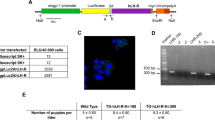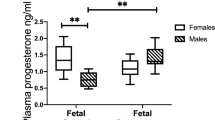Abstract
Since it has been shown that pregnancy protects the mammary gland from chemically induced carcinogenesis, this study was designed with the dual purpose of determining whether treatment of young virgin rats with the placental hormone chorionic gonadotropin (hCG) mimics pregnancy-induced changes in the tumourigenic response of the mammary gland and also whether the effect induced by both pregnancy and hormonal treatments was transitory, or a more permanent one, exerting the same effect when the period of time between delivery or termination of treatment and exposure to the carcinogen is lengthened. Virgin Sprague-Dawley rats were utilised in two experimental protocols. For protocol I, 50 day-old rats were either mated (Group II), or started receiving a daily intraperitoneal injection of 100 IU hCG (Group III) at age 50. Age-matched untreated virgin rats were used as controls (Group I). Twenty-one days after either delivery or termination of treatment all the animals received an intragastric dose of 8 mg DMBA/100 gbw. For the second protocol, 50 day-old virgin rats were also mated (Group V) or were treated with hCG for 21 days (Group VI); the resting period between delivery or termination of treatment was lengthened to 63 days, at which time they received a dose of DMBA. Age-matched controls (Group IV) received DMBA only. Tumourigenesis was evaluated 24 weeks post-carcinogen administration in all the groups. Pregnancy and hCG followed by the 21-day resting period significantly depressed mammary carcinogenesis to 11% and 6% respectively, compared with 63% in control animals. When the resting period was prolonged to 63 days there was also a significant depression in adenocarcinoma incidence to 9% in pregnancy (Group IV) in which it was observed that tumour incidence was also reduced as a consequence of aging at the time of exposure to the carcinogen. These results clearly indicate that hCG is as efficient as pregnancy and significantly reduces mammary carcinogenesis, and that the protective effect of both pregnancy and hCG treatment is long-lasting and both are more efficient than aging in reducing mammary carcinogenesis.
This is a preview of subscription content, access via your institution
Access options
Subscribe to this journal
Receive 24 print issues and online access
$259.00 per year
only $10.79 per issue
Buy this article
- Purchase on Springer Link
- Instant access to full article PDF
Prices may be subject to local taxes which are calculated during checkout
Similar content being viewed by others
Author information
Authors and Affiliations
Rights and permissions
About this article
Cite this article
Russo, I., Koszalka, M. & Russo, J. Comparative study of the influence of pregnancy and hormonal treatment on mammary carcinogenesis. Br J Cancer 64, 481–484 (1991). https://doi.org/10.1038/bjc.1991.335
Issue Date:
DOI: https://doi.org/10.1038/bjc.1991.335
This article is cited by
-
The role of gene to gene interaction in the breast’s genomic signature of pregnancy
Scientific Reports (2021)
-
Genomic signature of parity in the breast of premenopausal women
Breast Cancer Research (2019)



